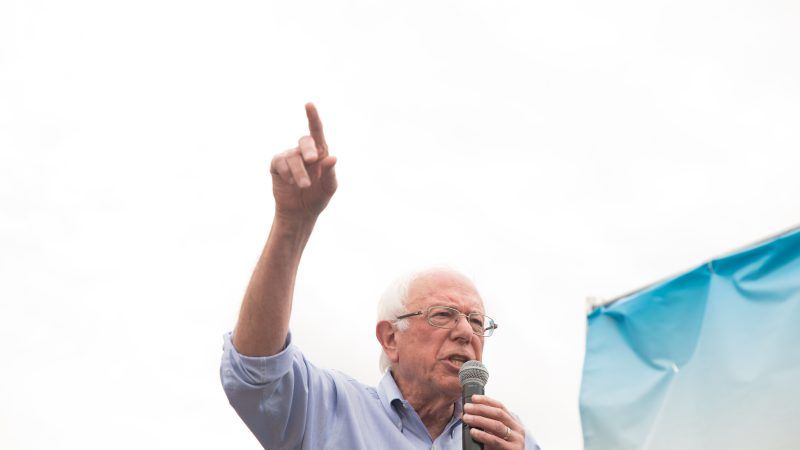Media Notices Bernie's Nonsense Conspiracies When They're About Media
The progressive senator's Trumpian anti-Bezos take is part of career-long history of fantasizing about evil billionaires.

On Monday, because it was a day ending in "y," presidential candidate Sen. Bernie Sanders (I–Vt.) made a conspiratorial insinuation about a billionaire. Reiterating his standard stump-speech complaint that Amazon does not pay federal corporate income taxes (which is both true and incomplete—the company paid more than $1 billion in non-federal income taxes in 2018, and got to its federal zero by making the kinds of domestic investments that Congress deliberately incentivizes), the democratic socialist then appended a just-asking-questions brain-teaser.
"I talk about that all of the time," Sanders noted. "And then I wonder why the Washington Post, which is owned by Jeff Bezos, who owns Amazon, doesn't write particularly good articles about me. I don't know why."
Because this sophomoric shade was thrown at a prestigious media outfit rather than a politically reviled industrialist, America's journalistic outrage-machine cranked up into high gear.
"Contrary to the conspiracy theory the senator seems to favor," Washington Post Executive Editor Marty Baron said in a statement Monday night, "Jeff Bezos allows our newsroom to operate with full independence, as our reporters and editors can attest." Outlets from NPR to the Poynter Institute to GeekWire noted that the senator's crack sounded "like Trump." The lead item in today's CNN Reliable Sources newsletter was "Dems take aim at media."
That clamor was in sharp contrast to the media crickets two months ago when Sanders tweeted out this equally conspiratorial garbage:
The Koch Brothers are preparing to try to buy the Democratic Party and buy the 2020 election. We cannot let them. The only way we will stop them is to build a grassroots progressive campaign that rejects their right-wing ideology.https://t.co/B0bNbLIxnR
— Bernie Sanders (@BernieSanders) June 11, 2019
A Nexis search of this equally fantastical claim brings up exactly one passing reference.
Bernie's half-century political career, consistent with the progressive economic tradition he now personifies, has been one long warning against a star chamber-like cabal that seemingly controls everything except political representation in the Green Mountain State. "There is a handful of people sitting at the head of the main banks controlling the destiny of underprivileged nations, the country as well as Vermont's economy," he warned, nonsensically, in 1976. "The real issue," he said in a presidential debate four decades later, "is that Congress is owned by big money."
Harmless hyperbole, you say? Hardly. Consider that while the Veterans Administration health care system was breaking down all around him in 2014, Sanders, then chairman of the Senate Veterans Affairs Committee, was affixing his ire on an alleged "concerted effort to undermine the V.A.," led by "the Koch brothers and others." As The New York Times would later recount, "Despite mounting evidence of trouble at the Department of Veterans Affairs, [Sanders]…initially regarded the complaints as overblown, and as a play by conservatives to weaken one of the country's largest social welfare institutions."
What about his oft-repeated claim that a Koch-backed group was attempting to "privatize" the V.A.? "Three Pinocchios," declared The Washington Post's fact-checker.
Charles and David Koch, the latter of whom used to sit on the Reason Foundation's Board of Trustees, are Bernie's favored target for unhinged speculation. "Open borders?" he famously said in a 2015 Vox interview. "No, that's a Koch brothers proposal."
Huh, so you'd think that dastardly duo might not be so fond of our restrictionist president? Nah! "Let us be clear," Sanders said last year. "You have the Koch brothers…having enormous power over the Trump administration." On his Senate website, he asserts that, "It is clear that the Koch brothers and other right wing billionaires are calling the shots and are pulling the strings of the Republican Party," which he then demonstrates by…quoting at length from the 1980 Libertarian Party platform?
Anti-corporate animus is so central to Bernie's worldview that even a statement made yesterday to distance himself from President Donald Trump's anti-media populism contained the same dystopian media-domination fantasies that the progressive left has been peddling for decades.
"We've got to be careful," Sanders replied to a questioner complaining about the media. "We have an authoritarian-type president right now who does not believe in our Constitution, who is trying to intimidate the media and so forth, and that's not what we do…But I think what we have to be concerned about in terms of media is that you have a small number of very, very large corporate interests who control a lot of what the people in this country see, hear and read. They have their agenda. That's what they want."
And concern over the "agenda" of those "very, very large corporate interests" has taken Sanders to some policy places that would seem to be at odds for his declared reverence to the Constitution. The senator's first-ever proposed constitutional amendment was a reversal of Citizens United v. FEC, in which the Supreme Court overturned on First Amendment grounds a federal prohibition on corporate entities' ability to broadcast political documentaries before an election.
In April last year, Sanders joined a group of senators asking the Federal Communications Commission (FCC) to investigate the "news activities" of the conservative local-TV conglomerate Sinclair Broadcast Group "to determine if it conforms to the public interest," and if that determination was negative, terminate the company's licenses. (The FCC wisely declined the invitation.)
Conspiratorial thinking, as Reason Books Editor Jesse Walker has continually reminded us, is the exclusive domain of neither the progressive left nor the authoritarian right. But there are some repeated tendencies in both camps. It would be nice if journalism outfits noticed that more often when their cherished colleagues are not the target.


Show Comments (76)